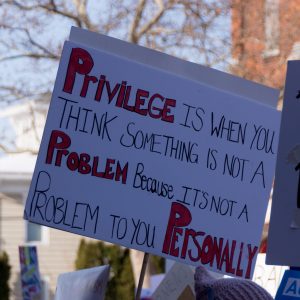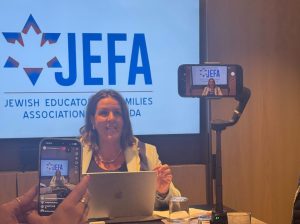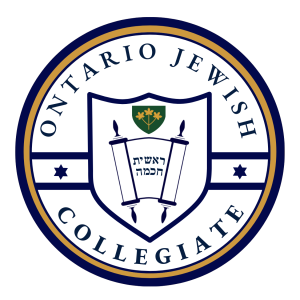 TORONTO — When Toronto native Avi Kopstick considered holding a panel discussion at Yeshiva University on gay issues, he was hesitant.
TORONTO — When Toronto native Avi Kopstick considered holding a panel discussion at Yeshiva University on gay issues, he was hesitant.
Avi Kopstick addresses a crowd of around 800 people at a Dec. 22 panel on gay issues at Yeshiva University. [Joel Feldman photo]
Kopstick, who is openly gay, helped start the Orthodox school’s Tolerance Club in September 2008, but he didn’t want to harm his group’s reputation by organizing such an event.
“We already had this reputation of being the gay club,” Kopstick, a chemistry major who’s scheduled to graduate this year, said of the Tolerance Club, which spreads awareness about racial and sexual minorities on campus.
“It wasn’t helping our success. We were thinking of not doing anything of the sort.”
Kopstick changed his mind after reading an anonymous public letter written by a student who was too scared to come out of the closet. A YU student newspaper wrote about the letter, which helped Kopstick open up a dialogue.
“I was really hoping to reach struggling people who are still in the closet,” he said. “That was my goal for being on the panel. I didn’t want people to feel the need to write anonymous letters.”
The controversial panel event, called Being Gay in the Orthodox World, was held Dec. 22 at the university, and attracted about 800 people.
The reaction from the school’s administration was almost immediate.
After the event, Yeshiva University president Richard Joel and Rabbi Yona Reiss, dean of YU’s Rabbi Isaac Elchanan Theological Seminary (RIETS), issued a statement saying that, because of recent events “we want to reiterate the absolute prohibition of homosexual relationships according to Jewish law.”
A letter, signed by six rabbis, was posted around the campus, stating that “homosexual activity constitutes an abomination.”
Rabbi Mayer Twersky, one of the roshei yeshiva at RIETS, responded to the panel with a speech.
“There was a point in which such a shmooze would have been unimaginable… Not only unnecessary, but inappropriate. Wrong,” he said to a group of students on Dec. 28.
“Appropriate sympathy [for gay students] is correct and warranted, but it’s a travesty when that sympathy is… exploited to create… a new category of a Jew who should be able to come out of the closet and identify himself,” Rabbi Twersky added.
Kopstick, who has been openly gay since he was 18, disagrees with Rabbi Twersky.
“[Rabbi Twersky] was the voice of fire and brimstone. He said basically that the event was a desecration of the school and a desecration of Heaven,” Kopstick said, adding that the rabbi also sent out a petition after his speech urging students to condemn the Dec. 22 panel.
Kopstick knows that being gay in the Orthodox Jewish community isn’t easy. He said he decided to attend YU in New York because of the lack of support groups in Toronto’s Orthodox community.
Justine Apple has seen first-hand the difficulties faced by Orthodox gays and lesbians.
As executive director of Kulanu Toronto, Toronto’s Jewish social group for lesbian, gay, bisexual and transgendered people, Apple has met Orthodox Jews who have struggled to come out of the closet.
“I think in the extreme Orthodox areas in Toronto, it wouldn’t be accepted to do what we’re doing,” she said. “We have [a Kulanu member] who comes from an Orthodox background and she’s very closeted. If her name gets out, that’s the end.”
Apple thinks groups such as the Tolerance Club would be good to have in any Orthodox institution.
“Orthodox Jews who are gay are not readily accepted into the community,” she said. “For them to have a tolerance group, it takes a lot of courage.”
For Kopstick, it took more courage to come out of the closet than to start the group at YU.
“The scariest part… is not really knowing what the risks are. You get a sense from what people say, what their viewpoints might be, but [you]… come face to face with someone [you] love, you never really know,” he said, adding that he told his rabbi about his sexuality when he was 18, and his parents when he was 20.
“I can’t say they’re not disappointed, but they still love me,” he said.
While Kopstick said he has enjoyed his time at YU, he knows of some gay students who have struggled.
“My time wasn’t made worse because I was gay,” he said. ‘But there are students who go to YU and have difficulty. Usually they’re… in the closet. If your rabbi doesn’t know you’re gay, he’s not going to talk more sympathetically when he talks about these issues.”
When rabbis talk about the fact that homosexuality is forbidden in Halachah, Kopstick doesn’t get upset.
“I think to do anything less would be intellectually dishonest… it’s very clear what the Halachah has to say on the matter,” he said.
The controversy at YU hasn’t stopped Kopstick from encouraging others to come out of the closet.
“I would like to universalize this challenge,” he said. “It shouldn’t just be a really sad struggle for someone who’s gay. It should be something that all Jews recognize as something very difficult.”






